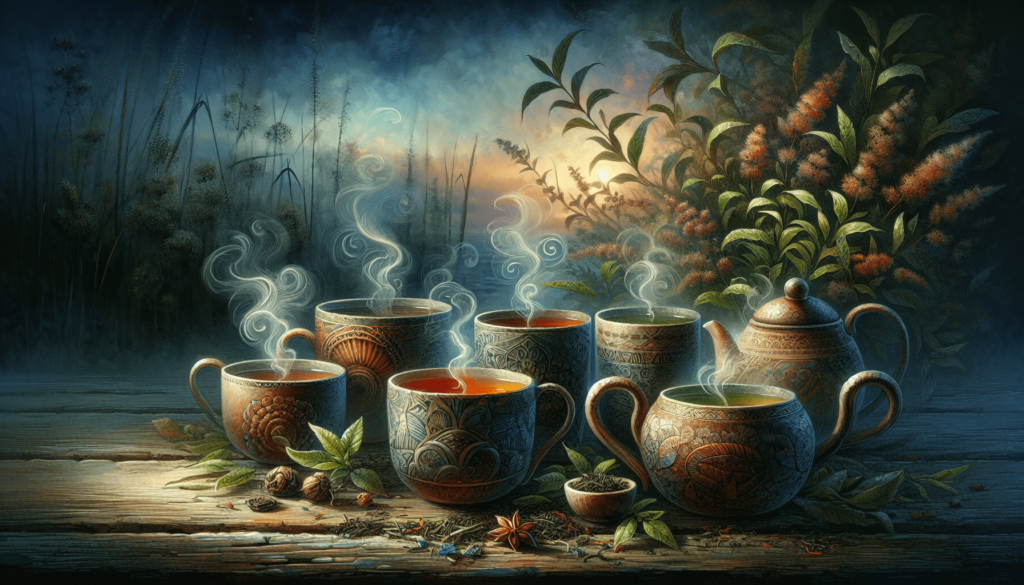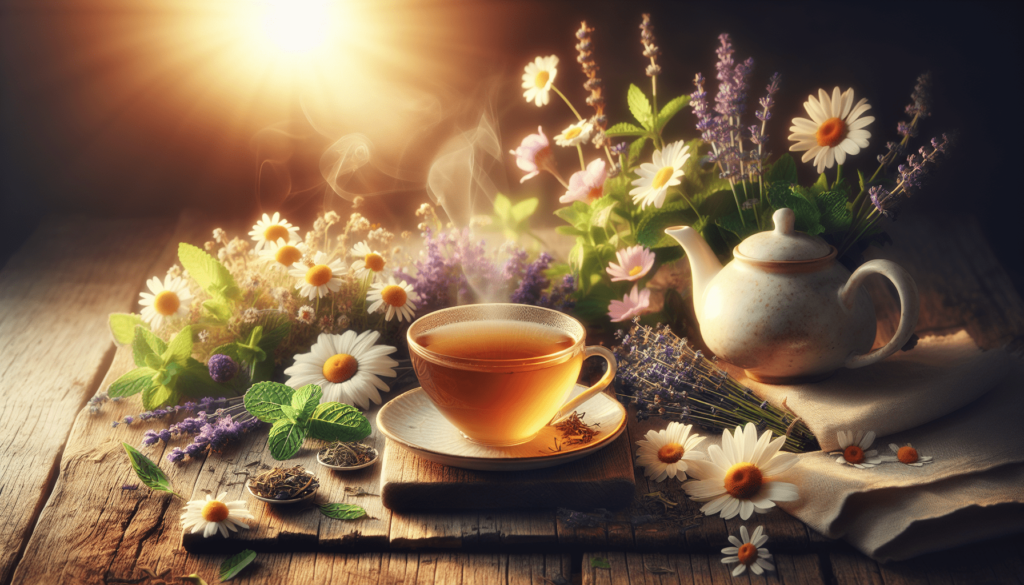Are you tired of constantly feeling stressed and anxious? Look no further than herbal teas, the soothing elixirs that can help melt away your worries. Packed with natural ingredients known for their calming properties, herbal teas offer a delicious and effective way to unwind after a long day. Whether you prefer a floral chamomile blend or a zesty lemon balm infusion, these delightful brews can provide the relaxation you need to find your inner peace. Say goodbye to restless nights and hello to a sense of tranquility with the power of herbal tea.

What is Herbal Tea?
Herbal tea, also known as tisane, is a beverage made by steeping herbs, flowers, or other plant materials in hot water. Unlike traditional tea, which is derived from the Camellia sinensis plant, herbal tea is caffeine-free and offers a wide range of flavors and therapeutic benefits. Herbal teas have been enjoyed for centuries, with different cultures and regions developing their unique blends and recipes. Whether you’re looking to relax after a long day or find relief from anxiety, herbal tea can be a comforting and natural remedy for both the body and mind.
Different Types of Herbal Tea
Herbal tea comes in many varieties, each with its own unique properties and health benefits. From calming chamomile to invigorating peppermint, there is an herbal tea for everyone’s taste and wellness needs. Here are some popular types of herbal tea:
Chamomile Tea
Known for its soothing properties, chamomile tea is derived from the flowers of the chamomile plant. It is often enjoyed before bedtime to promote relaxation and improve sleep quality.
Lavender Tea
Lavender tea is made from the aromatic flowers of the lavender plant. It is known for its calming scent and is often used to alleviate stress and anxiety.
Valerian Root Tea
Valerian root tea is derived from the root of the valerian plant. It is commonly used as a natural remedy for insomnia and is known for its sedative effects.
Passionflower Tea
Passionflower tea is made from the leaves and stems of the passionflower plant. It is known for its anxiety-reducing properties and can help promote relaxation and improve sleep.
Lemon Balm Tea
Lemon balm tea is made from the leaves of the lemon balm plant. It has a refreshing citrus flavor and is often used to alleviate stress, anxiety, and promote relaxation.
Benefits of Herbal Tea for Relaxation and Anxiety Relief
Herbal tea has long been revered for its ability to promote relaxation and provide relief from anxiety. Whether you’re looking for a moment of calm or seeking natural remedies for stress, incorporating herbal tea into your daily routine can have significant benefits for your overall well-being.
Promotes Relaxation
One of the primary benefits of herbal tea is its ability to promote relaxation. Many herbs used in herbal tea, such as chamomile and lavender, contain compounds that have calming effects on the nervous system. By sipping on a warm cup of herbal tea, you can create a soothing ritual that helps you unwind and release tension.
Reduces Anxiety and Stress
Anxiety and stress can take a toll on both our mental and physical health. Fortunately, herbal tea can help alleviate these symptoms. Certain herbs, like passionflower and valerian root, have been shown to have anxiety-reducing properties. By incorporating these herbs into your tea routine, you can naturally ease feelings of anxiety and promote a sense of calm.
Improves Sleep Quality
A restful night’s sleep is essential for physical and mental well-being. Herbal teas, such as chamomile and valerian root, are known for their sleep-inducing properties. These herbs can help calm the nervous system and prepare the body for a peaceful night of sleep. By incorporating herbal tea into your bedtime routine, you may experience improved sleep quality and wake up feeling refreshed.
How Herbal Tea Promotes Relaxation
Calming Properties of Herbal Tea
Many herbs used in herbal tea have calming properties that can help relax the mind and body. For example, chamomile contains apigenin, a flavonoid that binds to specific receptors in the brain and promotes relaxation. Lavender, on the other hand, contains linalool, a compound known for its sedative effects. By consuming herbal tea with these calming herbs, you can create a sense of tranquility and peace.
Natural Sedative Effects
Certain herbal teas, such as valerian root, have natural sedative effects. Valerian root contains compounds that interact with the brain’s neurotransmitters, promoting relaxation and sleep. By sipping on valerian root tea, you can harness the natural sedative effects to calm your mind and prepare yourself for a restful night’s sleep.
Encourages Mindfulness
Incorporating herbal tea into your relaxation routine can encourage mindfulness and help you be present in the moment. The act of preparing and savoring a warm cup of herbal tea can be a meditative practice, allowing you to disconnect from the stresses of daily life and focus on the simple pleasure of enjoying a comforting beverage. By practicing mindfulness, you can enhance the relaxation benefits of herbal tea and promote a sense of inner calm.

Herbal Tea as a Natural Anxiety Remedy
Anxiety-Reducing Properties
Certain herbs used in herbal tea have been found to have anxiety-reducing properties. For example, passionflower contains compounds that interact with specific receptors in the brain, reducing anxiety and promoting relaxation. By incorporating passionflower tea into your daily routine, you can naturally alleviate feelings of anxiety and promote a sense of tranquility.
Acts as an Adaptogen
Herbal tea, particularly adaptogenic herbs like ashwagandha and holy basil, can help the body adapt to stress and restore balance. Adaptogens work by supporting the body’s stress response system, reducing the impact of stress hormones and promoting a sense of calm. By incorporating adaptogenic herbal teas into your routine, you can find relief from anxiety and enhance your overall well-being.
Promotes Emotional Well-being
Anxiety and stress can have a significant impact on our emotional well-being. Herbal tea provides a natural and holistic approach to supporting emotional health. By sipping on herbal teas like chamomile or lemon balm, you can help regulate emotions, reduce feelings of restlessness, and promote emotional balance. Taking the time for a tea break can create a moment of self-care and promote overall emotional well-being.
The Role of Herbal Tea in Sleep Improvement
Calms the Nervous System
Our busy lives and constant exposure to stimuli can make it difficult to relax and unwind before bed. Herbal teas, such as chamomile and lavender, can help calm the nervous system and prepare the body for sleep. By incorporating herbal tea into your bedtime routine, you can create a peaceful and calming environment that promotes better sleep.
Reduces Sleep Disturbances
Sleep disturbances can have a negative impact on our overall well-being. Herbal teas, particularly those containing valerian root or passionflower, can help reduce sleep disturbances and promote a restful night’s sleep. These herbs have sedative effects that can help quiet the mind and induce a sense of relaxation, leading to improved sleep quality.
Induces Relaxation for Better Sleep
Herbal tea provides a natural and gentle way to induce relaxation, making it easier to fall asleep and stay asleep throughout the night. The act of drinking a warm cup of herbal tea before bed signals to the body that it’s time to unwind and prepare for sleep. By incorporating herbal tea into your evening routine, you can create a sleep-promoting ritual that helps you achieve a restful and rejuvenating night of sleep.
Tips for Choosing and Brewing Herbal Tea
Quality and Sourcing
When choosing herbal tea, it’s essential to consider the quality and sourcing of the ingredients. Opt for organic and sustainably sourced herbal teas to ensure that you’re getting the highest-quality ingredients. Look for brands that prioritize ethical sourcing practices and have a commitment to sustainability.
Choosing the Right Tea Blend
With a wide array of herbal teas available, it can be challenging to choose the right blend for your specific needs. Consider the flavor profiles and therapeutic benefits of different herbs and choose blends that align with your goals and preferences. Experiment with different combinations to find the herbal tea blend that resonates with you.
Proper Brewing Techniques
To fully enjoy the flavors and benefits of herbal tea, it’s essential to use proper brewing techniques. Start by selecting high-quality loose leaf herbal tea or tea bags. Follow the recommended brewing instructions, including water temperature and steeping time. Avoid using boiling water, as it can over-extract the flavors and potentially diminish the herbal tea’s benefits.
Other Relaxation Techniques to Combine with Herbal Tea
Meditation
Meditation is a powerful relaxation technique that can be combined with the soothing effects of herbal tea. Dedicate a few minutes each day to sit in stillness and focus on your breath. As you sip on your herbal tea, allow the warmth and flavors to guide you into a mindful state, promoting deep relaxation and inner peace.
Deep Breathing Exercises
Deep breathing exercises can help calm the nervous system and reduce feelings of anxiety. Combine deep breathing with the ritual of drinking herbal tea to amplify its relaxation benefits. As you take slow, deep breaths, focus on the sensation and aroma of your tea, allowing it to soothe your body and mind.
Yoga
Yoga is a gentle exercise practice that promotes flexibility, strength, and relaxation. Incorporate a short yoga sequence into your day, and complete it with a cup of herbal tea. As you move through the poses, concentrate on your breath and the sensations in your body, enhancing the overall relaxation and rejuvenation provided by herbal tea.
Aromatherapy
Incorporating aromatherapy alongside your herbal tea can enhance the relaxation experience. Pair your tea with essential oils, such as lavender or chamomile, to create a calming atmosphere. Use a diffuser or add a few drops of essential oil to a tissue or cotton ball and inhale deeply as you savor your herbal tea.
Precautions and Side Effects of Herbal Tea
Consulting a Healthcare Professional
While herbal tea is generally safe for most people, it’s essential to consult a healthcare professional, especially if you have any underlying health conditions or are taking medications. They can provide guidance on which herbs and teas are safe for you and advise on any potential interactions or contraindications.
Potential Allergies or Sensitivities
Individuals with allergies or sensitivities to specific herbs or plants should exercise caution when consuming herbal tea. Always read the ingredient list carefully and be aware of any potential allergens. If you experience any adverse reactions or discomfort after consuming herbal tea, discontinue use and consult a healthcare professional.
Avoiding Excessive Consumption
While herbal tea is generally safe, it’s important to consume it in moderation. Excessive consumption of certain herbs or teas may lead to side effects, such as digestive upset or drowsiness. Follow the recommended serving sizes and listen to your body’s response to ensure a safe and enjoyable herbal tea experience.
Conclusion
Harness the power of herbal tea to promote relaxation and find relief from anxiety. With its wide variety of flavors and therapeutic benefits, herbal tea has become a go-to natural remedy for many individuals seeking calm and tranquility. Whether you choose chamomile, lavender, or another blend that speaks to you, incorporating herbal tea into your daily routine can create a soothing ritual that helps you unwind, reduce anxiety, improve sleep, and enhance your overall well-being. So, brew a cup of herbal tea, find a quiet moment, and let its healing properties envelop you in a sense of calm and relaxation.





